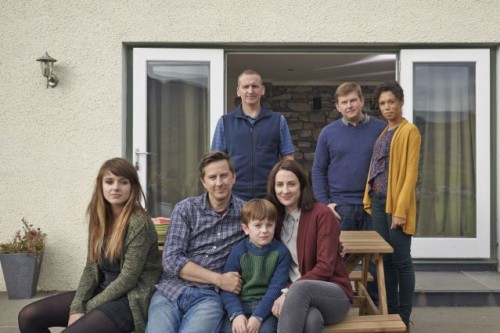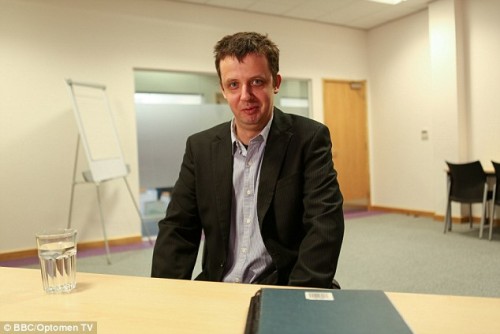THAT WAS THE BOX – March 2016 (Week Four) | TV Reviews
We have reviews on THE A WORD; EMPLOYABLE ME and THE TUBE: GOING UNDERGROUND.
‘THE TUBE: GOING UNDERGROUND‘ (CHANNEL 5 – MY5)
A programme very similar to this was made by BBC a few years ago and I thoroughly enjoyed it. As a Londoner it is always interesting to watch all the various systems that make our lives tick by relatively easily on a day-to-day basis, and I guess for those who don’t live in the Smoke, it’s fascinating to watch the metropolis and it’s 24 hour existence and seemingly endless stream of people coming and going, barely interacting and yet sharing a relatively small space.
Twenty thousand people work on the tube and they earn every penny. Trying to deal with irritating people in rush hour, who can’t even follow simple instructions like standing on an escalator or what platform they should be on, must be infuriating and it would take nerves of steel to put up with it all.
At forty-two years old, the Piccadilly Line is almost as old as me, and just as knackered. The trains get flat tyres when they’re confronted with the weather, and the driver has no flashy computerised system to help them drive the train. Instead they have a series of buttons and levers that look better suited to the London Transport Museum than something that is carrying millions of passengers each year.
We met controller Charlotte who has worked for the Underground all her working life, and is now in charge of coordinating the Piccadilly Line. Her cool head when a driver drifted off (mentally) and held up the whole system, was amazing as she juggled trains and rearranged things so the line kept running. Apparently drivers having mental lapses are common, which is quite scary given the weight of responsibility on their shoulders. But on the other hand, they do mostly work in the dark and are being rocked along on a train, which could make you feel a bit sleepy.
The show had quite a light-hearted tone to it, but all the same you felt nothing but admiration for those who work on the tube. Like poor old Naeem, whose first day in customer services, consisted of making public announcements no one wanted to listen to, and trying to herd people who were determined to go one way, even though they were better off going in another. There was also Station Controller Tony, who had the idea of making people stand on both sides of the escalator, during rush hour. As usual, people were ignoring him and continuing to walk up the escalators, prompting the evening papers to write a scathing review of the plan. However, by the end of the programme, and a few weeks later, it looked as though it was beginning to pay off. Apparently the escalators are the most dangerous part of whole tube system. Maybe my nan was right in never wanting to go on them.
My blood ran cold during the scenes at Highbury and Islington, where poor Tino, a guy who is brought in to marshal crowds at big events, had to contend with thousands of Arsenal fans, as well as the usual commuters. Bottle-necks were forming by the barriers and still people piled in and one couldn’t help but think of Hillsborough. Thankfully, they closed the platform, directing people elsewhere, and the congestion eased. Of course people were moaning about it. Fair enough, no one wants to be late home, but surely late home is better than not home at all?
‘THE A WORD‘ (BBC1 – BBC IPLAYER)
Not being a parent, I can’t imagine what it is like, your child being diagnosed with autism. I’d like to think I would face it head on, accept my little one was different and to hell with the rest of the world who didn’t like it. But I suspect I would be pretty much like Paul and Nicola, the lead characters in this interesting new drama. When the final diagnosis comes, there is a sense of disbelief that their world is going to change forever. Their five-year-old son, Joe is placed on the autistic spectrum – explaining his obsession with wearing headphones and listening to music, the lack of engagement with other children and his encyclopaedic knowledge of songs written before his dad was born, let alone him. But at five, this sort of behaviour can be charming, dismissed as childhood eccentricity. Will it be as charming at twenty-five?
‘The A Word‘ is keeping to the BBC brief of not setting everything in London. After the Yorkshire setting of ‘Happy Valley‘, we now have ‘The A Word‘ set in the Lake District, which lends beautiful scenery, but I fear coping with an autistic child, without the comfort of your dad nearby, as well as your brother-in-law and his adulterous wife, would be a lot harder. Cities are big and lonely enough as it is, to face life-like this with a child who people are afraid to engage with, must be even harder.
Another reviewer said that Christopher Eccleston is a little miscast as the grand-dad, whose old-fashioned ways of child-rearing, clash horribly with the modern touchy feely softly softly approach. I’m inclined to agree, but not because he’s being expected to play a gormless character (he’s a fine actor, he can manage gormless) rather that he looks too young to have children in their late thirties. But this is a small criticism. I confess I only watched ‘The A Word‘ because there was nothing else on, but I’m glad I did. The subject matter is mundane compared to murders or spies or internal police investigations, but it is something that effects thousands of families every year. I had a colleague who once had a theory that all of us featured somewhere on the autism spectrum, and while that isn’t necessarily true, the chances are you know someone who is autistic, because it is so common.
And finally, props to young Max Vento who plays Joe. I suspect he’s a little older than five, but not much, and yet he nails the part of a little boy who finds it hard to engage with the world, but at the same time isn’t a horrid brat you find it hard to care for. Joe is impish and cute and hopefully, in time, his autism won’t define him.
‘EMPLOYABLE ME‘ (BBC2 – BBC IPLAYER)
And continuing the theme of people with disabilities, we come to this show that is clearly inspired by the wonderful ‘Undateables‘ on Channel Four. Instead of trying to find romance, the people in this programme are trying to enter the world of work, after being held back for years by their neuro-disability. Some might say it is a mouthpiece for the government, trying to prove that not everyone deserves to be signed off work because they have a disability, but I won’t get too political.
This week’s episodes focused on two men. Fifty-two-year-old Paul who has the worse Tourettes I have ever seen. Normally the illness takes the form of vocal or physical tics, but Paul had both. As well as shouting out random, stream of consciousness statements (Hitler were good!), he also twitches and hits himself. What must be so devastating for him and his wife and kids is that up until six years ago his condition was very mild, but the death of a close friend exacerbated his symptoms and up until now he has been unable to work. When he goes for a job with a fishing trawler, the boss, whilst very nice, tells him in so many words, he would not be able to cope with the anxiety of such a stressful and lonely job. It is only after seeing an occupational psychologist (who he tics and tells her she is gorgeous) that she encourages him to pursue the tasks that make him focus and he enjoys doing. It transpires he is a fantastic photographer and indeed his tics all but disappear when he is taking pictures.
Then there was thirty-four-year-old Brett, who I just wanted to give a big hug to. He has autism, and unlike Joe in ‘The A Word‘, who just presents as ‘different’, poor Brett is trapped within his own mind. He cannot communicate properly without writing it down and reading it out, he barely makes eye contact and I have no idea why his mum thought he could go for a job as a taxi driver, as this requires talking to people, which is something he finds difficult.
He goes to see Simon Baron Cohen (a cousin, before you Google it) at Cambridge University, who sets him a task in rearranging matchsticks into a pattern, which Brett does quickly and Simon admits that he would have to look up how to do it. People with autism think far more visually than most of the population and process things by how they look. Under his shyness and inability to concentrate, Brett was incredibly clever, having taught himself to play the piano beautifully and how to do modelling on the computer (I spent 2 years at uni doing this and I still can’t master it!). Brett was given work experience at a company that makes medical devices – his first job in eight years, and while he finds it difficult to communicate with his new colleagues, it soon becomes apparent that his eye for detail and meticulous nature will be an asset to them.
Paul gets the chance to go to a photography publisher in London, who provides wall art to most major retailers. The boss is highly impressed by Paul’s beautiful pictures and by the end we discover that he has sold three of them to the company and they hope to buy some more.
At the end of his trial at the medical devices company, Brett gives a heartfelt speech that moves everyone to tears (including me) and they offer him a permanent job. At the end we find out that he is doing well, and for someone who feared ending up a lonely old man, he has also made friends.
I enjoyed this programme a lot. My only criticism is that I fear in the real world, without a camera crew following them around, the likes of Paul and Brett would not have access to the sorts of employers they ended up working for; but no one can take away their achievements and I look forward to the rest of the series and how the various people get on.




